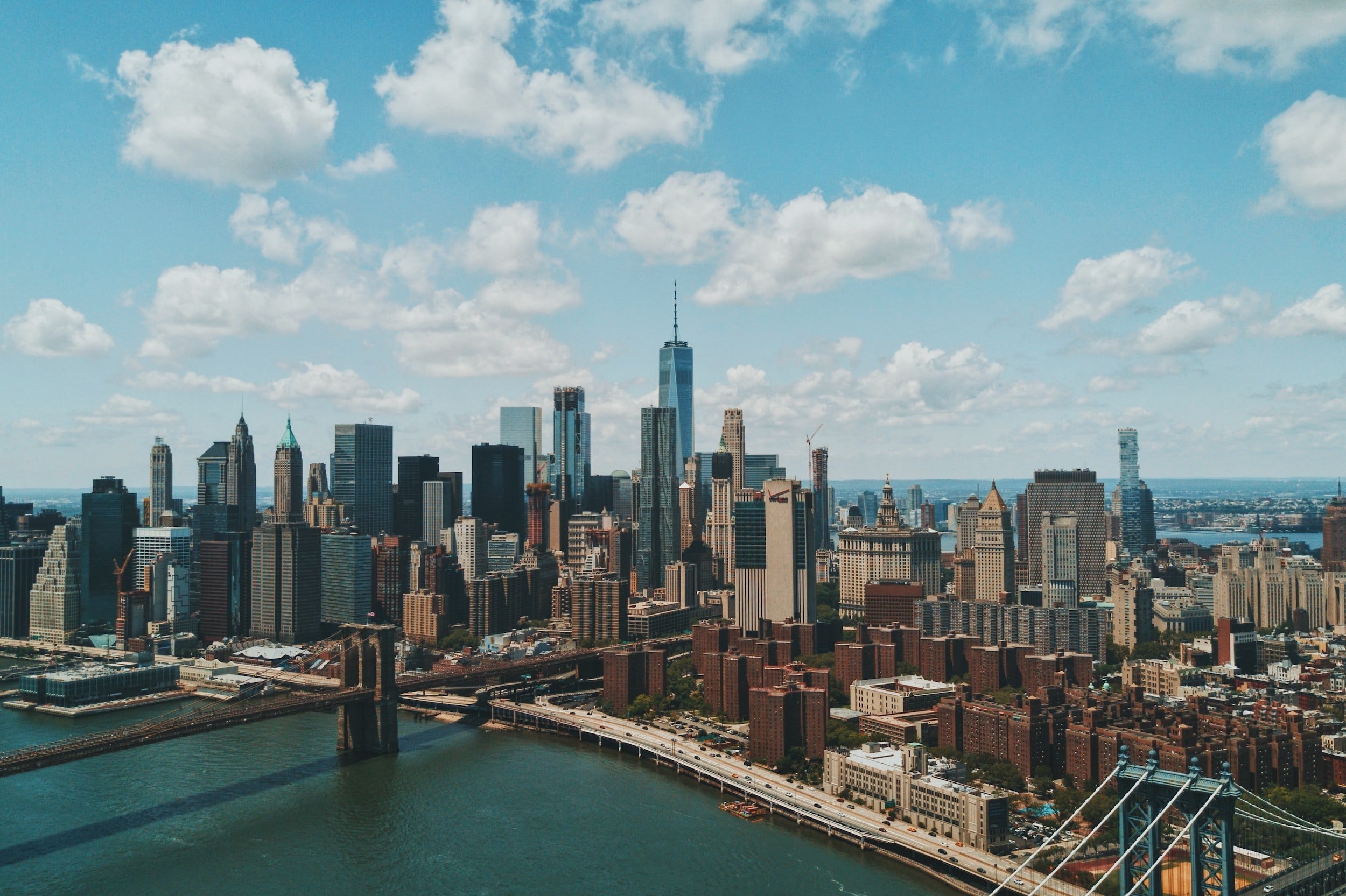
OUR MISSION
Our Mission is to grow as a caring, justice-making, anti-racist, diverse, spiritual community.
We, the members of The Community Church of New York Unitarian Universalist, embrace the transforming vision of the "Beloved Community", a just world in which all persons can share equitably in the wealth of the world, and freely develop their gifts and potential.
We commit ourselves to provide for each other an intergenerational community of love, by embracing diversity and religious freedom, and by encouraging personal and spiritual growth through worship, social action, fellowship, and education.
We commit ourselves to action in our congregation, our city, our denomination, our country, and our world to bring the vision
of the Beloved Community to fruition.
OUR VISION
Sometimes it helps to take a step back and get a sense of the big picture. The last few years at Community Church have forced us to focus on what’s most immediate. Pandemic, lock-downs, masking, finances, the building sale, changing worship times, new church space – the urgency of each situation has filled our minds and defined our ministry for more than two years. But, as this new year begins, we have the luxury of a deep breath and a chance to think about where we’re going.
Community Church is on the precipice of a revival. We are doing the hard work of mending after years of mismanagement and heartache. We’re not done yet, but over and over again, I hear members saying they are ready. And, I’m witnessing it happening. In all my years serving in UU congregations, the Board I’m currently working with might be the healthiest, most creative, and most visionary. Our Council, having been revitalized and empowered, is emulating those same traits, which is equally exciting.
Religion, as an institution, is on a quick path downward. If we were to take a snapshot of Community Church, anyone would think we mirror well the national trends. Membership is down; volunteerism is way down. The act of showing up seems to no longer be a cultural norm or expectation. This means we have to – or we could say “we get to” – rethink the way we do everything.
Over these next two years, it is my intention to focus on membership. We need to both build back membership, inviting new people into our shared faith, and to deepen the connections people have here with each other.
As part of our objective to bring new members in, we are working to increase our profile. We’re doing that through podcasting, social media, a blog on the web page, my own writing, etc. We don’t have the same kind of meeting space we used to – and will again – but we are offering what we have to those who need it. I’m currently on several boards, nationally and statewide, as is Rev. Jude, which also garners us some attention and good will. We’re adding a bi-annual trip to Jordan, welcoming UUs from around the country to join us, and I’m hoping to expand our international work and relationship with the United Nations through several avenues including my own participation at UN climate conferences. I’m also starting to create a national lecture series on BIPOC Unitarian, Universalist, and UU history and leadership with a team of UU luminaries.
We have a powerhouse communications team to support this goal, and that team is working at least as hard on helping us connect with each other. The 21st century has seen an explosion in communication methodologies which is both an opportunity and a challenge.
One of the goals for this year is to increase programming internally so people can have fun, engage the world more actively, and live more deeply. This isn’t just about bringing in new members, but about bringing them in to some-thing, staying true to our vision of a Seven Day Church. We started Wellspring, a small group ministry and we’ll hold adult RE classes every month. We also have Circle Suppers that I’m hoping will become Circle Brunches and Lunches and who knows what else. It’s all good when it helps us connect with each other.
To make that happen, we need lay leaders. I’m profoundly grateful to those people who have stepped up and I fully understand why so many people have pulled back. It is my hope, though, that over these two years, more people sign up for leadership and for training. This training will include ways to welcome people, how to build an authentically inclusive community, and how to sustain leadership when it feels difficult.
Lay leadership would also put us back on the streets where we belong. I’ve been attending rallies and protests and would really love for more of our membership to take to the streets with me. If that kind of activism isn’t in our immediate future with our current membership, we can at least dig deeper into the subjects we’ve expressed interest in. We have an anti-racism group which I’d love to see expanded. Voter suppression is an immediate issue we can work on from our homes. We have a workshop budgeted for this year to learn about and build relationships with the Lenape. We’ve committed ourselves to the 8th Principle, which needs lay leaders if we’re going to put our bodies where our intentions are. And, after being closed for pandemic and then for renovations, our Shelter should be open again this fall. All of these things require member involvement. I hope over the next two years, we see innovative leadership helping us engage these issues.
Critical to all of this is a culture shift we’re going to be starting this year, but which will take time. We are building a culture of care. We’d all like to be part of a community where people care for each other. There are some gorgeous signs of that at Community Church, and we’re going to build on them so that the value of internal care-taking becomes part of the air we breathe. I’m thrilled that Br. Zachary has joined us as our Chaplain for Pastoral Care. He’s already started the work of relationship building and care-taking, modeling compassion and gentleness with spiritual grounding.
Until we have a strong lay leadership in place, and until we are functioning as a truly covenanted and caring community, we have an unparalleled staff team creating the infrastructure we need to fulfill our mission. Even as people come and go, the team, as a body, is competent and hard-working. But, when I arrived, they were also grossly under paid. People who have been with us for decades had never gotten raises. Cost of living hadn’t even been built into some budgets, creating a situation where people were effectively making less money than when they started. One of my goals is to increase staff salaries to (non-profit) market-rate, making employment at Community Church sustainable for our staff. Paying a living wage is a justice issue and it is an attainable goal. We have already made headway on this, and will need to be faithful to our values during budget season.
We’re also leaning into our role as a teaching congregation. We don’t have interns this year largely so we can rethink how we support these new ministers, ultimately building out the infrastructure to make us a sought-after site for students. In the meantime, Jil is establishing us in a new space – that of curriculum developers. Her All Eight program for youth is finding audiences around the country, and we are looking into additional opportunities to grow and flex this muscle.
My vision for these next two years includes finding and moving into new space. Things are looking very good on that front! All the work we did two years ago dreaming and designing the church we thought we’d have on 35th street has been very helpful in knowing what people want. Art gallery, chapel, fellowship hall, kitchen, yoga studio, choir, youth, meeting, and class rooms, in addition to space for local and national partners are all in our near future.
My larger vision is that Community Church becomes a Spiritual Center for Art and Activism, a place people can feed their spirits and experience themselves as part of covenanted community.
For these things to happen, we will have to start talking about covenant this year. We need to remember who we are, how we can embody our values, and how we can be loyal to the ways of love. This will sometimes require setting boundaries with each other because covenant and living into love isn’t the same as “being nice”. We aren’t here for nice. We are here for transformation. We are here for liberation. And we can bring that to each other as long as we treat each other with respect and kindness. To this end, we are going to have very difficult conversations about healthy boundaries and appropriate behavior. It might be uncomfortable, but if we can handle that, we can push through it and into the gorgeous vision of what Community Church was and will be. We are getting ready to revitalize our congregation and reclaim our place on the cutting edge of religious community.
When I take a step back, hope is what I see.
— Rev. Peggy Clarke, Senior Minister, Sept. 2022
What is Unitarian Universalism?
-
The inherent worth and dignity of every person;
Justice, equity and compassion in human relations;
Acceptance of one another and encouragement to spiritual growth in our congregations;
A free and responsible search for truth and meaning;
The right of conscience and the use of the democratic process within our congregations and in society at large;
The goal of world community with peace, liberty, and justice for all;
Respect for the interdependent web of all existence of which we are a part.
Journeying toward spiritual wholeness by working to build a diverse, multicultural, Beloved Community, by our actions that accountably dismantle racism and other oppressions in ourselves and our institutions.
-
Direct experience of that transcending mystery and wonder, affirmed in all cultures, which moves us to a renewal of the spirit and an openness to the forces which create and uphold life;
Wisdom from the world's religions which inspires us in our ethical and spiritual life;
Words and deeds of prophetic people which challenge us to confront powers and structures of evil with justice, compassion, and the transforming power of love;
Jewish and Christian teachings which call us to respond to God's love by loving our neighbors as ourselves;
Humanist teachings which counsel us to heed the guidance of reason and the results of science, and warn us against idolatries of the mind and spirit.
Spiritual teachings of earth-centered traditions which celebrate the sacred circle of life and instruct us to live in harmony with the rhythms of nature.
If you are interested in learning more, check out one of our Introduction to UU sessions in the Fall or Spring!
To find out how to join one of these sessions, e-mail our Minister of Community Engagement, Rev. Jude Geiger at jgeiger@ccny.org
